Why Your Smoke Detectors Need to Be Working (and How to Ensure They Are)
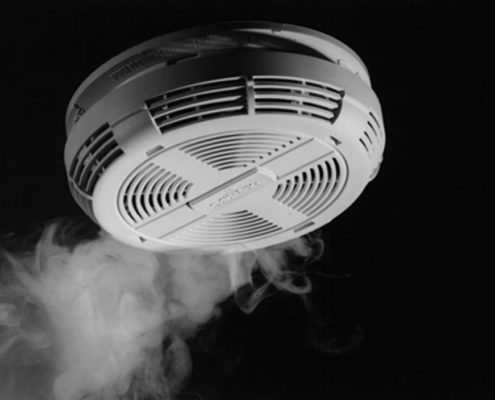
Smoke Detectors
I know – you know all about this topic. Everybody knows you need smoke detectors, right? In fact, 13 out of 14 homes do have smoke detectors.
So why am I writing about this?
Simple: In 2015, there were 365,500 home fires*. That’s 1,000 home fires per day. Approximately 50% of those homes had smoke detectors. Fires caused 2,650 deaths (approximately 7 per day). And 60% of those deaths occurred in homes without working smoke detectors.
“How can that be?” you ask.
Why Fires, Deaths and Injuries Occur in Homes
You need to hear/see your smoke detector when it goes off and respond appropriately. Smoke detectors must be:
- Installed
- Functioning properly
- In the correct places to detect smoke/fire
- Loud enough (or bright enough) to be heard (or seen)
Do not assume the smell of smoke will wake you. Fires often emit odorless, toxic gasses that can overcome people in their sleep.
Where to Install Alarms
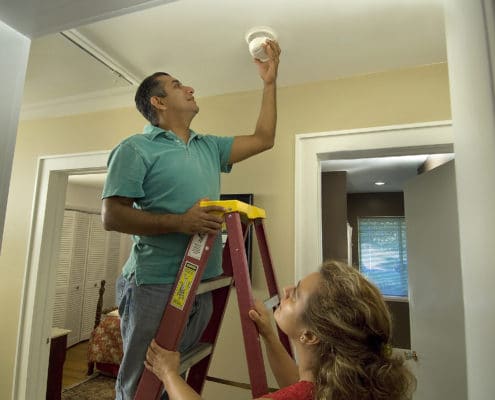
The National Fire Protection Association makes the following recommendations regarding the installation of smoke detectors:
- One smoke detector on each floor (including the basement) placed in the center of the ceiling, or if attached to a wall, be sure the smoke detector is mounted 6 – 12 inches below the ceiling.
- One smoke alarm installed between 10 and 20 feet of a cooking appliance (with hush feature to temporarily reduce alarm sensitivity in case you have anyone who cooks like my wife :-))
- One smoke alarm in each bedroom
- One smoke alarm outside of each sleeping area
- Do not install smoke alarms near heating apparatus, windows, ceiling fans, or bathrooms.
Types of Alarms
- Battery versus hardwired (with battery backup) – your best protection is with interconnected smoke detectors. There are now battery-operated, interconnected detectors equipped with wireless technology. Hardwired systems should also be interconnected so that when one detector alarm sounds, all detectors will sound.
- Many smoke detectors now incorporate carbon monoxide detectors. For homes with gas fireplaces, stoves, or other gas appliances, this is highly recommended.
- Photoelectric smoke alarms are responsive to smoldering fires while ionization smoke alarms are more responsive to flames. A combination alarm provides the most comprehensive protection.
Testing
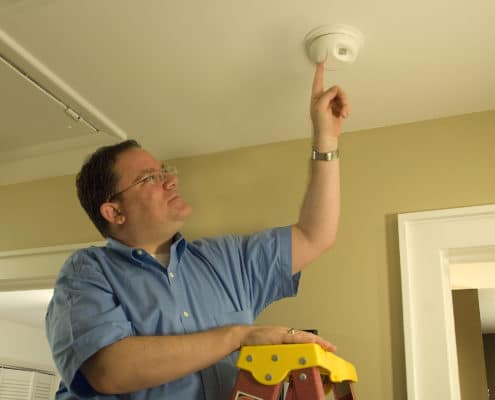
Smoke detectors need to be tested once a month. I know, it’s a hassle. And, anyway, your home is never going to catch fire. That’s what 365,500 people think (whose homes catch fire each year). Why take a chance? Manual testing is relatively quick and easy.
Be sure to test your smoke sensors by purchasing an aerosol spray made specifically for this purpose. You can generally find these sprays in a hardware or home improvement store.
There are self-testing smoke alarms that go the extra mile, including testing the smoke detection sensors, alerting your smart phone of an alarm going off (and location), the ability to turn off your HVAC system, and light your exit path if you are home when the alarm goes off. I think the full set of safety features is worth the investment if you have the ability to install such a system (about $1,200 for a 3 bedroom, one-floor home). Or you can hire a local electrician.
How to Manually Test Your Smoke Detector
A couple of preparation steps are necessary for testing. If other family members (or friends) are present, be sure to warn them you are doing a smoke detector test. Also, if you have a smoke detection system that is part of a monitored security system, be sure to let the security company know you are conducting a test. If you forget, be sure to have homemade brownies and milk ready for the local firefighters who show up.
To test your smoke detectors, press the test button for several seconds. You might want to put cotton in your ears or wear some ear plugs, because if working, the smoke detector will emit an attention-getting, loud alarm. If no alarm sounds, or is very weak, it’s time to replace batteries or call an electrician to service a hardwired system. You may want to enlist the help of another family member to stand farther away from the alarm (sitting on a bed, for example) to ensure the alarm is not only loud enough to hear at a distance, but is sufficiently loud to awaken a deep sleeper.
The alarm usually turns itself off after a few seconds, but if it doesn’t, press the test button a second time.
Next, take your aerosol spray (see above) specifically designed for testing the smoke sensors. Follow the directions found on the aerosol spray can. After the alarm sounds, you may use a vacuum to clear the spray. While you are there, it is a good idea to vacuum or dust your smoke detector each month to remove dust particles or dirt. Do not use any cleaning products on your smoke detectors as it may damage them. Similarly, do not paint your smoke detectors. If your alarm is equipped with a “silence button”, you may elect to use that to silence the alarm more quickly. Don’t let the alarm sound until the spray clears naturally as, if it is a battery-operated alarm, it may drain the battery.
If the alarm doesn’t sound, the detection unit needs to be replaced.
An alternative is to use several lit matches, ENSURING YOU HOLD THE MATCHES FAR ENOUGH AWAY TO PREVENT MELTING OR STARTING A FIRE, to test if the smoke sensors are functioning. Again, use a vacuum to clear the smoke to prevent draining your battery, or press the “silence button” if there is one.
I prefer using the aerosol spray for obvious reasons.
 Finally, if you have battery-operated smoke detectors, and you hear a chirping or beeping noise, replace the batteries immediately. Do not assume a cricket has taken up residence as my mother-in-law once did.
Finally, if you have battery-operated smoke detectors, and you hear a chirping or beeping noise, replace the batteries immediately. Do not assume a cricket has taken up residence as my mother-in-law once did.
Service Life
Everything wears out. It’s recommended you replace smoke alarms after 10 years.
*Source: Fire Loss in the United States 2015, Hylton J.G. Haynes, NFPA, September 2016
If you have any questions, please feel free to contact me:
VeroBeachElectrician@yahoo.com


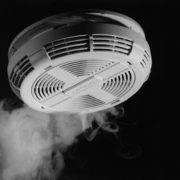
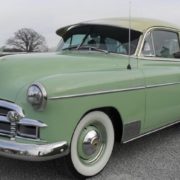
Leave a Reply
Want to join the discussion?Feel free to contribute!